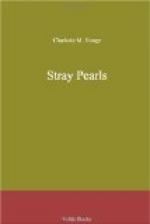It did not take long to tell him all, for Bellote did not understand English; I showed him the note, and he stood considering. He was not like his brothers, he had not lived in vain all those years with his sister Elisabeth in captivity, for there was a grave manliness about him though he was only thirteen. He said: ’do you think Lord Walwyn would see me? I am used to be with a sick person.’
Eagerly I sent up word. I knew my mother would never refuse entrance to royal blood; nor did she. She sent word that the Duke would do her son only too much honour by thus troubling himself. I did not miss the chance of marshalling him upstairs, and gaining one sight of my brother—oh! so sadly wasted in these few days, his cheeks flushed, his breath labouring, his eyes worn and sleepless, as he lay, raised high on his pillow. He looked up with pleasure into the Duke’s face. My mother was making speeches and ceremonies; but after bowing in reply, the Duke, holding Eustace’s hand, leant over him and said; ‘Can I do anything for you? Shall I send for a chaplain?’
Eustace’s eye brightened, and he answered in a voice so faint that the Prince only heard by bending over him:
’An order from the King for some one to remain—Then I need not be ever watching——’
‘I shall wait till he comes,’ said the Prince and Eustace gave such a look of thankfulness, and pressed the hand that had been laid in his.
The Duke, with politeness, asked permission of my mother to write a billet to his brother, with a report of Lord Walwyn, at the writing-table in the room. He wrote two—one to the King, another to the chaplain, D. Hargood, bidding him obtain orders from King Charles to remain with Lord Walwyn; and he despatched them by the gentleman who had followed him, asking permission of my mother to remain a little while with my lord.
Poor mother! she could not refuse, and she did, after all, love her son enough to be relieved, as an air of rest and confidence stole over his features, as the princely boy sat down by him, begging that he might spare some one fatigue while he was there. She sent me away, but would not go herself; and I heard afterwards that the Duke sat very still, seldom speaking. Once Eustace asked him if he had his Book of Common Prayer, for his own had been put out of his reach.
‘This is my sister’s,’ said the Duke, taking out a little worn velvet book. ‘Shall I read you her favourite Psalm?’
He read in a low gentle voice, trained by his ministry to his sweet sister. He read the Easter Epistle and Gospel too; and at last Eustace, relaxing the weary watch and guard of those dreadful days, dropped into a calm sleep.
If a miracle of recovery could be said to have been wrought, surely it was by Duke Henry of Gloucester.
Long and patiently the boy say there; for, as it turned out, the King was in the Cours de la Reine playing at bowls, and it was long before he could be found, and when Dr. Hargood brought it at last the Prince had actually watched his friend for four hours. He might well say he had been trained in waiting! And he himself gave the bouillon, when Eustace awoke without the red flush, and with softer breathing!




